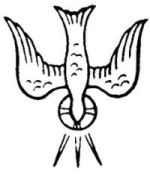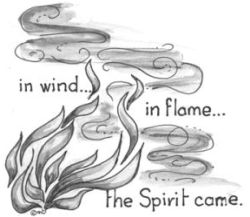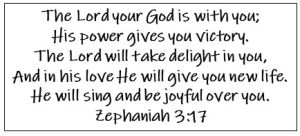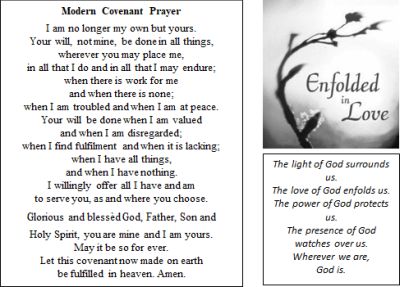 In a similar way, the gift God gave us at Christmas, His Son Jesus Christ, gives us life. His love, with no strings attached, means we no longer need to feel guilty and burdened by doubt and anxiety, but are forgiven and free to flourish.
In a similar way, the gift God gave us at Christmas, His Son Jesus Christ, gives us life. His love, with no strings attached, means we no longer need to feel guilty and burdened by doubt and anxiety, but are forgiven and free to flourish.Minister’s Letter (2024)
[2022 letters], [2023 letters]
In Victor Hugo’s novel, Les Misérables, Jean Valjean steals bread to feed his starving nephews and nieces. He is caught and sent to prison, serving a total of 19 years after repeatedly trying to escape. On his release, he is given a yellow passport, which marks him as an ex-convict making him unwelcome wherever he goes. Only the kind Bishop Myriel of Digne trusts him enough to take him in and give him food and a bed to sleep in.
But Valjean betrays this trust, compounding his own dire situation, when he repays the hospitality of by stealing some valuable silverware. To his great surprise, the bishop, instead of accusing Valjean, covers for him, telling the police that he gave him the treasure as a gift – and even adds two silver candlesticks, urging Valjean to use them to become an honest man.
This extraordinary act of grace transforms Valjean. He repents of his criminal life to become a man of integrity and generosity, dedicating his life to helping others. He even becomes a devoted guardian to the orphaned Cosette. What was stolen as loot is turned into a gift, marking a profound turning point in Valjean’s life. The bishop’s undeserved kindness offers Jean a new beginning: it gives him life!
 In a similar way, the gift God gave us at Christmas, His Son Jesus Christ, gives us life. His love, with no strings attached, means we no longer need to feel guilty and burdened by doubt and anxiety, but are forgiven and free to flourish.
In a similar way, the gift God gave us at Christmas, His Son Jesus Christ, gives us life. His love, with no strings attached, means we no longer need to feel guilty and burdened by doubt and anxiety, but are forgiven and free to flourish.
So, as we approach the festive season, let’s give thanks for the love God showed us in giving us his life-giving Son, and be inspired to offer life-giving generosity, not only to our friends and families, but also to the poor and vulnerable in our communities.
As Jesus said in John 10 verse 10, ‘I have come that they may have life, and have it to the full.’
Sam Mortimer, CurateNovember
Is there anyone ….. to whom I can show kindness?
In the Old Testament book of 2 Samuel, there is a touching story concerning King David and a less well-known character, Mephibosheth. One day David asked, ‘Is there anyone still left of the house of Saul to whom I can show kindness for Jonathan’s sake?’ A servant of Saul’s household told the king that there was still a son of Jonathan named Mephibosheth.
Mephibosheth had lived a privileged life until he was five, but in one fell swoop his life was transformed. The Philistines slaughtered King Saul and his son Jonathan in battle. When this news reached the royal court, people fled in terror. Mephibosheth’s nurse snatched him up but as she hurried to get away, he fell and became disabled, lame in both feet.
It seems that a few survivors of King Saul’s court went to live in a place called Lo Debar, its name meaning ‘no place’ or ‘no pasture’. This is where Mephibosheth would have grown up. He was disabled socially and economically, as well as physically, because he was the grandson of defeated King Saul.
 Pibosheth was a grown man by the time David discovered his existence. Perhaps Mephibosheth feared David wanted to eliminate the last living relative of Saul. (Saul had tried to kill David on several occasions.) But no, David invited Mephibosheth back to the royal court and restored his family’s land, in memory of his friendship with his father Jonathan.
Pibosheth was a grown man by the time David discovered his existence. Perhaps Mephibosheth feared David wanted to eliminate the last living relative of Saul. (Saul had tried to kill David on several occasions.) But no, David invited Mephibosheth back to the royal court and restored his family’s land, in memory of his friendship with his father Jonathan.
From then on Mephibosheth ate at King David’s table regularly. He was treated with dignity, like one of the king’s own sons, and was given the support he needed. David seemed to regard Mephibosheth’s disability as irrelevant and he was welcomed and valued for who he was, not because of any influence he might have. Mephibosheth who came from ‘no place’ found a place of belonging.
The Hebrew word translated kindness means steadfast love and faithfulness, and it is used to describe God’s loving kindness to his people. It is a love that is undeserved, unearned, and cannot be repaid.
Many people today need to find a place of belonging. In the season of Remembrance, we think especially of service men and woman who have been disabled in conflict. Some may face difficulties finding work, somewhere to live or a place in society after leaving the military.<>/p>
People who are disabled, whether physically, psychologically or financially, need to feel valued and respected. They, like all people, matter to God. The church should be a place of belonging for all who feel they have no place.p> Is there anyone to whom we can show kindness?
Is there anyone to whom we can show kindness?
We may not have resources of King David at our disposal, but we can use words and actions that are kind, that bring dignity, that show acceptance, and that help restore a person to wholeness.
Liz Welters, Assistant MinisterOctober
New beginnings"While the earth remains, seedtime and harvest, cold and heat, summer and winter, day and night, shall not cease"
Genesis 8:22
October. Already? Perhaps it is my age, but it does indeed seem as if the seasons are spinning around more and more quickly. And so, yes, we are already planning for Christmas! But I guess that is one of the few things we can be certain of - that as long as the earth remains one day will follow another. Sometimes the passing of time makes me feel gloomy – the days slipping away and with them all the hopes and dreams that they held. But in reality each new day is a gift of possibilities. a new beginning.
At the moment I seem to be surrounded by new beginnings – my daughter starting a new job, a grandchild on the horizon. In our schools we have been presenting the new children with a schultute to say a warm welcome from the church family. And various households are filled with the mixed feelings of sending their ‘children’ off to university or to a new job in another part of the country. In church there have been christenings and weddings – special occasions that mark new beginnings, new stages in life.
And alongside that, there have been some losses of long standing members of the community, with all the pain that entails for the family. But these too are new beginnings – for the person that has died, Christians believe this is a new beginning of moving nearer to God in eternal life, and for those that are left behind, the new beginning of working out how to move forward, how to form a new life without that person being there in the same way that they have been.
In our school assemblies and in Fun @ Four we have also been focussing on new beginnings. They are a time for looking back and giving thanks for all that has been good, and looking forward and putting the next steps into God’s hands. Because new beginnings, whether positive or sad ones, can be rather daunting. All the ‘what ifs’, and the ‘can I do this?’ can be overwhelming. Thankfully we only ever have to go one step at a time, but as we go, it can be comforting to know that we travel with God. The Bible verse Deuteronomy 31:8 states, "The LORD himself goes before you and will be with you; he will never leave you nor forsake you. Do not be afraid or be dismayed". A good thing to remember at the start of each day as we face its possibilities!
Whatever new challenges you are facing in your life at the moment, may you be aware of God going with you.
PS. I found this poem on the internet. I rather liked it and hope you will too.

September
HARVEST
September sees the beginning of the annual round of harvest services. At them we celebrate the gathering in of the grains, fruit, meat, and vegetables grown over the preceding months; we give thanks for farmers, and for all people whose work contributes in any way to the production of the food and drink that sustains our lives. We give thanks for our good fortune for living in a part of the world that has not [or not yet, anyway] experienced the utter devastation wreaked on other countries by climate change or war. We may even consider marking our good fortune by making a donation to a charity that helps those less fortunate than ourselves.
Funnily enough though, some Harvest hymns, while enabling us to praise and thank God for all these gifts, also take the opportunity to remind us of that final ‘harvest’ - when God’s kingdom comes. For example the last verse of “Come ye thankful people come”:
Even so, Lord, quickly come,
bring thy final harvest home;
gather thou thy people in,
free from sorrow, free from sin,
there, forever purified,
in thy presence to abide;
come, with all thine angels, come,
raise the glorious harvest home.
There is a country bright as day
beyond the crystal river,
where hunger will be done away
and thirst be gone forever;
where praises ring out loud and strong
that now with ours are blending;
where we shall sing the harvest song
that never has an ending.
We are rejoicing in all the good things about harvest, so why this referencing to the ‘end times’ ? I suppose because harvest time should heighten our awareness of how lucky we have been to reap this year's harvest, and how unlucky millions of others have been who have not. The Bible teaches us that we have an overwhelmingly gracious and generous God and that God asks us to respond to that graciousness by being gracious and generous in our turn – to all in any kind of need, the ‘stranger within our gate’. So at harvest time we need reminding that we should not just lap up everything we can get without a thought for others who have little or nothing. What sort of people are we?
 St Paul in his letter to the Galatians uses a ‘harvest’ image to tell us: “ you reap whatever you sow. If you sow to your own flesh, you will reap corruption from the flesh; but if you sow to the Spirit, you will reap eternal life from the Spirit. So let us not grow weary in doing what is right, for we will reap at harvest time, if we do not give up. So then, whenever we have an opportunity, let us work for the good of all”. Harvest time offers an opportunity to do just that, and reminds us that we are accountable to God!
St Paul in his letter to the Galatians uses a ‘harvest’ image to tell us: “ you reap whatever you sow. If you sow to your own flesh, you will reap corruption from the flesh; but if you sow to the Spirit, you will reap eternal life from the Spirit. So let us not grow weary in doing what is right, for we will reap at harvest time, if we do not give up. So then, whenever we have an opportunity, let us work for the good of all”. Harvest time offers an opportunity to do just that, and reminds us that we are accountable to God!
August
GO TO A LAND I WILL SHOW YOU
 Abraham is the most known nomadic pastoralist in the Old Testament. He wandered for many years between the two great rivers and God was leading and guiding him. Abraham came from Ur of the Chaldeans. Historians think that probably Ur is somewhere between the Euphrates and Tigris rivers and closer to modern day Kuwait.
Abraham is the most known nomadic pastoralist in the Old Testament. He wandered for many years between the two great rivers and God was leading and guiding him. Abraham came from Ur of the Chaldeans. Historians think that probably Ur is somewhere between the Euphrates and Tigris rivers and closer to modern day Kuwait.
It was while Abraham was at Haran that God called him to go to a nation, culture, people and environment he did not know. There were a lot of painful events that happened in Abraham’s life but all those events did not take away his trust in God. Remember Abraham was rich and being told to leave everything and go to an unknown land was not easy. Abraham was circumcised at close to one hundred and that must have been painful indeed. At first he had a barren wife.
Remember Abraham still had no child when God called him at Haran and so leaving his close relatives and clan was not easy. At the age of seventy-five, most people will have established their lives and be wanting to retire and enjoy the last years of their lives in peace, but for Abraham he had to start a new life. Abraham was a man of great faith and it is that kind of faith that the world of today needs. The kind of faith that moves mountains. The faith of even accepting to sacrifice the only Isaac.
When my family and I left Zimbabwe for the UK, we did not know the land and kind of people we were going to meet. We thank God that unlike Abraham, we can speak English and communication is better. I don’t know if Abraham was fluent in the language of the people he met for the forty years he wondered in the wilderness. Coming to Shelswell Benefice was not easy. We had a lot of questions in our minds as a family when we finally passed the interviews.
Like Abraham we were coming to a land God was going to show us. Our fears were turned into joy when we experienced love, care, smiles, a well-furnished house and almost everything we did not expect. When one trusts and believes in God, they will never walk alone. It is a blessing to be a member of this benefice and a villager in Fringford. We feel safe here.
We continue to pray to God to guide and lead us as a family as we minister in this lovely benefice. May the good Lord bless you and continue to have faith and trust in God.
Fr ALEXI am Your ship
Lord, I am Your ship.
Fill me with the gifts of Your Holy Spirit.
Without You I am empty of every blessing,
And full of every sin.
Lord, I am Your ship.
Fill me with a cargo of good works.
Without You, I am empty of every joy,
And full of vain pleasures.
Lord, I am Your ship.
Fill me with love for You.
By John Sergieff (1829 – 1908; a priest in Russia)
July
O still, small voice of calm.
Sarah and I have just returned from a refreshing – bracing even – holiday in the Highlands of Scotland. One of the highlights of the Lodge we were staying at was a hot tub. The initial shock getting into water at 38°C when the air was at 11 degrees was rapidly replaced by an invigorating warmth. But what really struck us was when we stopped talking: how quiet it was. No cars, no jets on a nearby flightpath, no background hubbub. Just a silence that was almost magical.
It made me wonder; do you sometimes find that life is so full of noise that you can hardly hear yourself think? Are you ever so inundated with “incoming” communications from multiple channels like TV, radio, social media, email, junk mail, news apps, and podcasts that you lose sight of the answers you are looking for? Or do you find that the noise can come from within as you struggle to fulfil your dreams?
The prophet Elijah experienced a similar thing when he ran away from King Ahab and his wife Jezebel, hiding in a cave at mount Horeb:
The Lord said, ‘Go out and stand on the mountain in the presence of the Lord, for the Lord is about to pass by.’
Then a great and powerful wind tore the mountains apart and shattered the rocks before the Lord, but the Lord was not in the wind. After the wind there was an earthquake, but the Lord was not in the earthquake. After the earthquake came a fire, but the Lord was not in the fire. And after the fire came a gentle whisper.
1 Kings 19:11-12
Elijah was feeling like a total failure, that he was the only prophet of the Lord God left. His mind would have been in absolute turmoil. The point God was making to him was to tune out all the noise in his head, notably the fear of an evil royal family, to be still and listen to his wisdom breaking through.
This story reminds us of the value of quietness in a noisy world. Taking time to reflect and meditate helps us filter out the cacophony to find meaningful insights and truths. And it reminds us to be open to the idea that God can work through the seemingly insignificant. Not all answers come from the loudest or most obvious sources. Why not spend some time purposefully listening out for God’s voice in the ordinary events of life? It can also be life-giving to others when we are the source of quiet encouragements, “seeding” them gently into people’s lives.
Finally, as you read this, I expect polling day in the UK general election will be almost upon us. I hope you will be able to filter out the noise from a loud campaign and vote for the party you most trust to address the priorities God may be laying on your heart.
Prayer (based on Psalm 46)
Lord, our refuge and strength,
In the face of earthquakes, tsunamis,
And nations in uproar,
Help us to be still and know that you are God.
Lead us to the river of gladness
And the holy place where you dwell.
Lift your voice so that we can hear you,
Bringing peace in our lives, our nation, and our world.
Amen.
June
Now that I am old and my hair is grey…. …. do not abandon me, O God! Psalm 71.18
In February members of the Ministry Team went to an interesting session at Emmanuel Church, Bicester, to hear about the Anna Chaplaincy. Anna Chaplains are named after the faithful widow, Anna, who appears with Simeon in Luke’s gospel at the time of Jesus’ presentation in the temple. Anna Chaplaincy is a ministry undertaken by volunteers in communities to provide emotional and spiritual support to older people in their own homes, sheltered housing or care homes. The Chaplaincy was set up to respond to a growing need for a distinctive ministry to older people, and their families and carers, as the population ages. The need for spiritual care continues, regardless of age.
In 2018 there were 1.6 million people aged 85 years and over. This is projected to rise to 3 million by 2043. According to Age UK, 58% of people over the age of 75 live alone, and 1.3 million older people say they have not been in contact with a friend, family or neighbour for more than a month.
Although we are not in a position to develop the Anna Chaplaincy in the Benefice in a formal way, the Organisation (which is part of BRF Ministries) has useful resources. People who visit and support elderly family, friends and neighbours may find such resources helpful. (www.annachaplaincy.org.uk)
Now that I am old and my hair is grey, do not abandon me, O God!
Now that I am old and my hair is mostly grey, it seems time for a change of emphasis. Living with rheumatoid arthritis and its associated conditions - including poor circulation - for 44 years has taken its toll. Fortunately, the treatments are so much better now than when I was first diagnosed. God’s grace, along with medication, has enabled me to be upfront (and upright!) for far longer than I anticipated. With Alice’s agreement, I will now be taking fewer Sunday services, especially in the winter, and I hope to concentrate more on helping to support people who are no longer able to get to church.
Please contact me:
Anna Chaplaincy Carer’s Guides:
The Anna Chaplaincy Prayer
Faithful God, you have promised in Christ to be with us to the end of time. Come close to those who have lived long and experienced much. Help them to continue to be faithful and, within the all-age kingdom of God, to find ways to go on giving and receiving your grace, day by day. For your glory and your kingdom. Amen
Dementia Information and Resources
Dementia Action Week, an awareness raising campaign, was held last month. This year’s theme is dementia diagnosis. There are currently more than 900,000 people with dementia in the UK, with this number set to rise to over 1.1 million by 2030. Helpful information and resources are available from:
The Alzheimer’s Society - www.alzheimers.org.uk
The website has information about dementia, finding support and help with care, and finances.
Includes a Dementia Guide, Living well after your diagnosis, and a Guide for Carers.
They provide a Dementia Support Line, with trained staff ready to help. Tel: 0333 150 3456
Dementia UK - www.dementiauk.org Tel: 020 8036 5400
Numerous advice leaflets can be downloaded or ordered by post.
There is a free, confidential Dementia Helpline which is staffed by dementia specialist Admiral Nurses who provide information, advice and support with any aspect of dementia. Tel: 0800 888 6678
They also offer phone or video call appointments lasting 45 minutes in virtual clinics. Available Monday to Friday, 9am - 4pm, and. See website for more details.
Age UK
Age UK provides a free advice line on 0800 678 1602, open 8am-7pm, and community-based support services for people living with dementia and their carers. For dementia information guides visit:
www.ageuk.org.uk/services/information-advice/guides-and-factsheets/dementia-guides/
Forget Me Not Bicester
Forget Me Not (Bicester) Ltd is a friendship and lunch club which aims to prevent loneliness
and social isolation for older people. It provides person-centred care led by friendly staff in
a safe, fun environment, a two-course hot lunch, a range of activities, exercises, professional
live entertainment and good company. Carers can leave their loved ones, safe in the knowledge that they are being looked after by staff, who between them have over 30 years’ experience in day care settings and are qualified in dementia care. If you are interested in joining the club, or volunteering, please phone: 07507 749931 or email: mail@forgetmenotbicester.co.uk - you’ll be sure of a warm welcome.
May
Not just for Whitsun
Very occasionally, you may still hear people talking about the Spring Bank Holiday as the ‘Whitsun’ break. Until 1965, this national holiday took place on the Monday after Pentecost; but the inconvenience of its date, always 50 days after the moveable feast of Easter, finally argued for its replacement with a fixed ‘day off’. Our inherited cultural calendar understood the intimate connection between these two great feasts, which share an almost equal weight in the cycle of the Christian year.
Easter proclaims the resurrection of Christ from the grave, the transformation of humanity into something glorious after its passage through pain and death. It celebrates something fundamentally mysterious, defying explanation. The disciples are confounded by the risen Christ when they encounter him: as the gardener, the companion on the journey to Emmaus, or the stranger on the shoreline. Jesus is almost unrecognisable - until their eyes are opened, and they begin, fragmentarily, to understand. The risen Lord is no revived corpse. He is the flickering image of the human future, cast into the shadowy present of his friends for them to behold.
 Fifty days after the resurrection, the disciples wait in the Upper Room. In the calendar of the Old Covenant, it is the Feast of Weeks, Shavuot, commemorating the gift of the Law on Sinai. The disciples hear the wind and behold the flames, and then find they are able to speak and be understood by many as they are filled by the Holy Spirit. They receive something far greater than the Law this Pentecost because God himself comes to inhabit them. He comes as the advocate, source of consolation and giver of gifts, who will speak the truth through them to all who will hear. He comes as love to dwell in their hearts, making sense of the mystery of the Christ they have encountered, and enabling them to share that mystery with others. Pentecost gives the disciples all they need to pass on what they have received from the Lord, so that others too may believe, and be transformed.
Fifty days after the resurrection, the disciples wait in the Upper Room. In the calendar of the Old Covenant, it is the Feast of Weeks, Shavuot, commemorating the gift of the Law on Sinai. The disciples hear the wind and behold the flames, and then find they are able to speak and be understood by many as they are filled by the Holy Spirit. They receive something far greater than the Law this Pentecost because God himself comes to inhabit them. He comes as the advocate, source of consolation and giver of gifts, who will speak the truth through them to all who will hear. He comes as love to dwell in their hearts, making sense of the mystery of the Christ they have encountered, and enabling them to share that mystery with others. Pentecost gives the disciples all they need to pass on what they have received from the Lord, so that others too may believe, and be transformed.
The gift of Pentecost is not just for Whitsun. It flickers in every natural gift and skill we possess. It rises to a flame in Baptism, in the sharing of the Eucharist and the life of Christian discipleship. To us it gives the ability, and the boldness, to pass on what we have received, and to live faithfully and lovingly in hope of the glory which is to come.
This article by Revd Dr Dominic Keech is reprinted with permission from The Sign.This year Pentecost (Whit Sunday) is 19th May.
Whirlwind Spirit
 Whirlwind Spirit of God,
Whirlwind Spirit of God,
Roar through our timidities and fears,
Shake the foundations of our ill-placed securities,
Sweep away the cobwebs of our apathy,
Blow down the walls that separate us, one from another.
Then into all our empty spaces, breathe
re-strengthened courage to challenge injustice,
renewed belief in the urgency of our vocation,
revitalised passion to change our lifestyles,
re-dedication to speak only words that build and unite.
Let gentle breeze and still small voice
become in us today
mighty wind and loud proclamation.
Make of us a Pentecost people!
Amen.
April
Thank you so much for your warm welcome into the Shelswell Benefice.
As you probably know, my start here was severely disrupted by crashing my bike crossing the “Bainton Splash”. As advised by a physiotherapist, that will be the last time I try to ford a stream on two wheels! The accident forced me into six weeks of convalescence, that coincided with Lent, the period when we reflect on the time Jesus spent in the wilderness following his baptism by John, and before starting his ministry in Galilee:
At once the Spirit sent him out into the wilderness, and he was in the wilderness for forty days, being tempted by Satan. He was with the wild animals, and angels attended him.
Mark 1:12-13
Jesus needed to spend time away from the world, preparing for what was going to be an intense time of travelling, teaching, and healing. Regular “retreats” also became an integral part of his life pattern during his three years in Northern Israel.
At times my time at home did feel like being in the wilderness. In such circumstances it can be tempting to despair. But I was looked after by a loving wife, and many kind friends came to visit me – I certainly felt like I was attended by angels and not wild beasts! And I rapidly came to appreciate this new-found space in my life, space to relax (listening to my music back-catalogue!), sit in God’s presence and reflect on what’s next.
Isn’t that something we all need to do? Modern life is that hectic, with so many priorities conflicting with each other, sometimes it can be hard to know how to plan or prepare for the future. Don’t many of us feel over-faced, dissatisfied, and stressed out?
Perhaps surprisingly, the solution to this can be the opposite of what you might expect – rather than frantically dividing our time between planning and action, to take time out to rest, recharge our batteries and spend time with God. Those who do this regularly often find they have renewed energy, clarity of vision and motivation to get important things done.
Traditionally, Lent is a time of self-denial and reflection. But as that season comes to an end and we enter Easter, why not take forward a desire to create space in our lives to be kind to ourselves, that we might better love our neighbours?
Prayer
Loving Father,
We thank you for the gift of life, and for this day.
In the hustle and bustle of life, help us to set aside time:
to rest,
to focus our distracted senses on you,
and to be restored in heart, soul and mind.
As we bring our cares and worries to you,
Give us a peace that surpasses all knowledge.
In the name of your precious Son, our Lord Jesus Christ.
Amen.
March
You are delightful!
 I wonder how you have been encouraged over the years? Who has encouraged you? What did they do that encouraged you?
I wonder how you have been encouraged over the years? Who has encouraged you? What did they do that encouraged you?
As I reflect on this, I am aware that some of the people who have encouraged me probably never knew they were doing it. They were just doing a job well and with kindness. They were just smiling as they walked by. They just said a cheery word. Other people didn’t do anything particularly extraordinary – just a word of appreciation or a thoughtful act. But these things matter, don’t they!
And of course it works the other way round too. Within the space of two hours I have heard about two people left thinking they were rubbish through the hurtfulness and thoughtlessness of others. I doubt that the people who caused the hurt were even aware of it. In one of the situations, I suspect they even thought that they were being helpful and encouraging. In the other, they just weren’t thinking – and that was the problem, and they weren’t thinking about the impact that their sloppiness was having on the other person.. And we’ve all been there, haven’t we – you stand in a long queue in the bank or shop, and when you finally get to the front, the tone of voice of the person serving you leaves you feeling like something unpleasant stuck to the bottom of their shoe. Or someone is so busy trying to tell you what you ought to do, what they would do, indeed what they did do, that you end up feeling truly inept and stupid.
Most of us, however we appear on the outside, have fairly fragile insides. Even if some of the time we feel confident and assured, our image of ourselves is easily knocked and we are left feeling rubbish, that we are incapable and have nothing to offer, and that, in contrast to everyone else, we are no good. And somehow, the memory of those hurtful words and actions can persist and persist.
 The truth is that each of us is a unique and precious individual, dearly loved by God. The Bible tells us that God delights in us and even though he knows our weaknesses, he sees our strengths, our gifts, our talents, and knows the ways that we, and only we, can bless other people, make the world a better place. God never thinks we are rubbish, because he knows we are not! And of course, on Good Friday, we remember that God thought we were so precious, so worth bothering with, that he was prepared to give up everything for us.
The truth is that each of us is a unique and precious individual, dearly loved by God. The Bible tells us that God delights in us and even though he knows our weaknesses, he sees our strengths, our gifts, our talents, and knows the ways that we, and only we, can bless other people, make the world a better place. God never thinks we are rubbish, because he knows we are not! And of course, on Good Friday, we remember that God thought we were so precious, so worth bothering with, that he was prepared to give up everything for us.
Our true value is our worth in God’s eyes – and in God’s eyes we are infinitely precious. We need to remember this for ourselves. And we also need to remember it about others. That’s why we need to treat each other with care and respect. That’s why we need to do the tasks of the day to the best of our ability. That’s why we need to encourage one another. Because a simple word or act of encouragement can make all the difference in the world.
Alice
February
It is still Epiphany-tide as I am writing this letter. The feast day of the Epiphany is on 6 January, but the ‘season’ carries on until 2nd February when we remember the day the baby Jesus was presented in the Temple in Jerusalem. This day is sometimes called ‘Candlemas’ because in many churches, after the Communion has taken place, the people will process around the building with lighted candles rejoicing in the birth of Christ, ‘the light of the world’. Epiphany-tide is the time when the coming of Christ into the world is revealed as being for all people, all nations. The wise men from the east who visited the child Jesus were from outside Israel. The two old people who encountered Jesus when he was presented in the Temple, recognized him as the Messiah and, as St Luke’s Gospel expresses it, the one to bring salvation for all people “to be a light to lighten the Gentiles: and to be the glory of thy people Israel”.
There is a lovely custom associated with Epiphany. When the wide men followed the star they came to Bethlehem and crossed the threshold of his birthplace, where they found the blessing they were seeking. In remembrance of this some churches, or homes, use chalk to mark the main doorway with the following inscription: 20 + C + M + B + 24. The 20 and 24 represent the date of this year. The C + M + B represent the traditional names of the wise men - Caspar, Melchior and Balthasar – but also the Latin phrase ‘Christus, mansionem benedicat’ which means ‘Christ bless the house’. [In Bavaria, Germany, people dressed as the wise men actually go round the houses and chalk the doors.] As we mark the threshold of our home or of our church in memory of the wise men’s journey we pray, at the threshold of the new year, that Christ will bless our homes and remain with us throughout the year.

You could do this for yourself, and then pray:
Visit, Lord, we pray, this home with the joy of your presence.
Bless all who live here with the gift of your love.
Help us share your care and compassion with one another,
to make this a place of welcome and strength,
of blessing and friendship,
that all who pass through this doorway
may find a hearth and home lit by the light of love.
May we grow with Christ in truth and wisdom,
as we learn to follow in his steps,
and take on his yoke,
that we may be blessed by his grace,
and find refreshment for ourselves, soul and body,
as we walk in his light into the adventure of this new year.
We make our prayer through the same Christ our Lord. Amen.
And then, when Epiphany and Candlemas are past, we turn to Ash Wednesday and the start of Lent (on 14 February this year), and the journey of preparation that brings us to the sadness of Passiontide and the joy of Easter Day. How shall we make the journey this year?
Penny Wood LLMJanuary
New Year Resolutions – or Re-Commitment?
 During my time in Waddesdon, Anglicans and Methodists held a joint Sunday service every so often. A particularly moving occasion for me was when we joined in worship for the Methodist Covenant Service. This service is often held on the first Sunday of the year.
During my time in Waddesdon, Anglicans and Methodists held a joint Sunday service every so often. A particularly moving occasion for me was when we joined in worship for the Methodist Covenant Service. This service is often held on the first Sunday of the year.
The practice of holding a Covenant Service dates back to John Wesley, who wanted to provide an opportunity for Church members to make, or renew, their covenant with God. In the service Methodists joyfully celebrate God's gracious offer made to all people in Jesus Christ, that "I will be their God and they shall be my people."
 The emphasis of the whole service is on God’s readiness to enfold his people in generous love. It is not so much about coming into a relationship with God, more about remaining in it. It highlights the importance of living within the loving relationship that God has already offered, following the supreme example of Jesus who shows what it is to live in a relationship with God.
The emphasis of the whole service is on God’s readiness to enfold his people in generous love. It is not so much about coming into a relationship with God, more about remaining in it. It highlights the importance of living within the loving relationship that God has already offered, following the supreme example of Jesus who shows what it is to live in a relationship with God.
God's gracious offer is also a challenge, not just to individuals but to the whole congregation. If God is committed to his people, are they prepared to accept that as a reality and commit themselves to God in return? People are encouraged to continue to work out the implications for their lives of the fact that their relationship with God had been renewed in and through Christ.
Wesley’s first formal covenant service was held in 1755, and revisions have been made over the years, the latest being in 1999. The modern wording of the Covenant Prayer below, which is included in the Methodist Worship Book, makes it very clear that the affirmation is a serious one that embraces the whole of Christian life. The Covenant Prayer is preceded by prayers for forgiveness and an encouragement to trust in God’s promises and rely on his grace.

Understandably most people find the prayer tough to say and really mean it. The prayer does not imply that God sends troubles upon us, rather that in all circumstances of life we will continue to find God.
The Covenant Prayer is so central to the Christian life that other Churches have also adopted it. Should our Anglicans Churches do the same?
Liz Welters (Associate Minister)